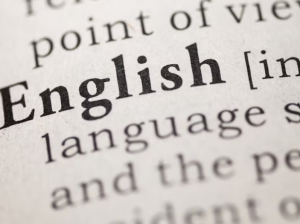John Hamilton McWhorter V es un lingüista estadounidense con especialidad en lenguas criollas, sociolectos e inglés negro. Actualmente es profesor asociado de lingüística en la Universidad de Columbia, donde también enseña estudios estadounidenses e historia de la música.
En el artículo “El inglés no es normal” escrito por McWhorter, se hace hincapié en el hecho de que las personas que hablan inglés durante toda su vida o que lo aprenden desde cero rara vez se dan cuenta de su rareza. Se trata de peculiaridades tanto gramaticales como léxicas detrás de la lingua franca. Por lo tanto, la primera rareza asociada con el inglés es el hecho de que no hay un idioma remotamente similar al inglés que una persona pueda entender parcialmente debido a su fluidez en inglés. En segundo lugar, el inglés es uno de los pocos idiomas que no tiene artículos o inflexiones específicos de género. Además, el inglés es el único idioma que requiere específicamente una terminación singular en tercera persona sin inflexiones en otras personas.
Los autores explican tal rareza rastreando la historia de nuestro idioma hasta la existencia y el desarrollo del inglés antiguo que era bastante similar al alemán. Sin embargo, las modificaciones introducidas por varios asentamientos dentro de Inglaterra han hecho que el idioma no se parezca en nada a su homólogo germánico más antiguo. Los idiomas que contribuyeron a la modificación del inglés incluyeron el celta, el nórdico antiguo, el francés y el latín. Si bien contribuciones como la interpretación del nórdico antiguo parecían hacer que el idioma fuera “más fácil”, los múltiples préstamos del francés y el latín dieron como resultado una etimología compleja y el surgimiento de versiones más “sofisticadas” de las palabras inherentemente inglesas.
De hecho, la actual pluralidad estructural y léxica propia del inglés está inspirada en la multiplicidad de opciones tomadas de las tradiciones lingüísticas de los diferentes idiomas. El erudito concluye diciendo que la profunda peculiaridad del idioma inglés se deriva principalmente de su “escandalosa historia”. Tal conclusión extraída de la investigación define perfectamente la rareza detrás del idioma inglés. La parte más peculiar del artículo, en mi opinión, es el hecho de cómo el inglés tiende a diferenciar entre lenguaje menos y más académico y sofisticado.
Este último, por su parte, se produce principalmente con la ayuda de las contrapartes francesas y latinas de las palabras inglesas. De hecho, mientras escribía este resumen, inconscientemente opté por préstamos franceses y latinos más complejos para cumplir con las expectativas de un esquema más formal. El hecho de usar latín “concluye” en lugar de “finaliza” o “termina” respalda las afirmaciones de rareza inglesa, con la palabra “impar” originaria del nórdico antiguo. Por lo tanto, se puede concluir que John McWhorter presentó una serie de ideas valiosas sobre la comprensión de los orígenes y patrones del idioma inglés.
John Hamilton McWhorter V es un lingüista estadounidense con especialidad en lenguas criollas, sociolectos e inglés negro. Actualmente es profesor asociado de lingüística en la Universidad de Columbia, donde también enseña estudios estadounidenses e historia de la música.
En el artículo “El inglés no es normal” escrito por McWhorter, se hace hincapié en el hecho de que las personas que hablan inglés durante toda su vida o que lo aprenden desde cero rara vez se dan cuenta de su rareza. Se trata de peculiaridades tanto gramaticales como léxicas detrás de la lingua franca. Por lo tanto, la primera rareza asociada con el inglés es el hecho de que no hay un idioma remotamente similar al inglés que una persona pueda entender parcialmente debido a su fluidez en inglés. En segundo lugar, el inglés es uno de los pocos idiomas que no tiene artículos o inflexiones específicos de género. Además, el inglés es el único idioma que requiere específicamente una terminación singular en tercera persona sin inflexiones en otras personas.
fluidez en inglés. En segundo lugar, el inglés es uno de los pocos idiomas que no tiene artículos o inflexiones específicos de género. Además, el inglés es el único idioma que requiere específicamente una terminación singular en tercera persona sin inflexiones en otras personas.
Los autores explican tal rareza rastreando la historia de nuestro idioma hasta la existencia y el desarrollo del inglés antiguo que era bastante similar al alemán. Sin embargo, las modificaciones introducidas por varios asentamientos dentro de Inglaterra han hecho que el idioma no se parezca en nada a su homólogo germánico más antiguo. Los idiomas que contribuyeron a la modificación del inglés incluyeron el celta, el nórdico antiguo, el francés y el latín. Si bien contribuciones como la interpretación del nórdico antiguo parecían hacer que el idioma fuera “más fácil”, los múltiples préstamos del francés y el latín dieron como resultado una etimología compleja y el surgimiento de versiones más “sofisticadas” de las palabras inherentemente inglesas.
De hecho, la actual pluralidad estructural y léxica propia del inglés está inspirada en la multiplicidad de opciones tomadas de las tradiciones lingüísticas de los diferentes idiomas. El erudito concluye diciendo que la profunda peculiaridad del idioma inglés se deriva principalmente de su “escandalosa historia”. Tal conclusión extraída de la investigación define perfectamente la rareza detrás del idioma inglés. La parte más peculiar del artículo, en mi opinión, es el hecho de cómo el inglés tiende a diferenciar entre lenguaje menos y más académico y sofisticado.
Este último, por su parte, se produce principalmente con la ayuda de las contrapartes francesas y latinas de las palabras inglesas. De hecho, mientras escribía este resumen, inconscientemente opté por préstamos franceses y latinos más complejos para cumplir con las expectativas de un esquema más formal. El hecho de usar latín “concluye” en lugar de “finaliza” o “termina” respalda las afirmaciones de rareza inglesa, con la palabra “impar” originaria del nórdico antiguo. Por lo tanto, se puede concluir que John McWhorter presentó una serie de ideas valiosas sobre la comprensión de los orígenes y patrones del idioma inglés.
PrisioneroEnArgentina.com
Enero 14, 2022